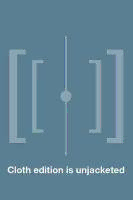
Reading machines : toward an algorithmic criticism PDF
Preview Reading machines : toward an algorithmic criticism
READING MACHINES STEPHEN RAMSAY Reading Machines i-xii_1-100_Rams.indd 1 10/27/11 1:53 PM Topics in The digiTal huManiTies Humanities computing is redefining basic principles about research and publication. An influx of new, vibrant, and diverse communities of practitioners recognizes that computer applications are subject to continual innovation and reappraisal. This series publishes books that demonstrate the new questions, methods, and results arising in the digital humanities. SerieS editorS Susan Schreibman Raymond C. Siemens i-xii_1-100_Rams.indd 2 10/27/11 1:53 PM Reading Machines StePhen rAmSAY univeRsiTy of illinois pRess Urbana, Chicago, and Springfi eld i-xii_1-100_Rams.indd 3 10/27/11 1:54 PM © 2011 by the Board of Trustees of the University of Illinois All rights reserved Manufactured in the United States of America 1 2 3 4 5 c p 5 4 3 2 1 ∞ This book is printed on acid-free paper. Library of Congress Cataloging-in-Publication Data Ramsay, Stephen. Reading machines : toward an algorithmic criticism / Stephen Ramsay. p. cm. — (Topics in the digital humanities) Includes bibliographical references and index. isbn 978-0-252-03641-5 (cloth) — isbn 978-0-252-07820-0 (pbk.) 1. Linguistic String Parser (Computer grammar) 2. Discourse analysis—Data processing. 3. Reading machines (Data processing equipment) I. Title. p98.5.p38r36 2011 401'.41—dc22 2011006829 i-xii_1-100_Rams.indd 4 10/27/11 1:54 PM For William and Mary Ramsay i-xii_1-100_Rams.indd 5 10/27/11 1:54 PM One no longer noticed the accidents of things but only the substance of the universe, and this is why we did not care whether the flawless surface was a liquid equilibrated according to eternal laws, or a diamond, impervious except under a light falling from above. —Alfred Jarry, Exploits and Opinions of Dr. Faustroll, Pataphysician i-xii_1-100_Rams.indd 6 10/27/11 1:54 PM conTenTs Preconditions ix 1 An Algorithmic Criticism 1 2 Potential Literature 18 3 Potential Readings 32 4 The Turing Text 58 5 ’Patacomputing 69 Postconditions 83 Notes 87 Works Cited 91 Index 95 i-xii_1-100_Rams.indd 7 10/27/11 1:54 PM i-xii_1-100_Rams.indd 8 10/27/11 1:54 PM pRecondiTions When Willard McCarty proposed that we “ask in the context of computing what can (and must) be known of our artefacts, how we know what we know about them and how new knowledge is made,” he undoubtedly meant to lift our gaze above the merely practical matters suggested by the term “humani- ties computing” (McCarty 1231). For to ask such questions “in the context of computing” is to suggest that computing belongs in the rarefied atmosphere of epistemology—that it is less a matter of doing (or allowing, or facilitating) this or that with the human record, and more a matter of providing an addi- tional, and perhaps an uncommonly fertile, occasion for theoretical musing and contemplation. For McCarty, actual results are less important than the insights gained from the juxtaposition of mechanism and mind. The field can proudly and justly describe itself as “the quest for meaningful failure” (1232). Against this view stand those who regard computers in the humanities as providing a welcome relief from the radical skepticism of contemporary hu- manistic thought. Here, after all, is a machine that not only gives answers but also demands them—a device that is wholly intolerant toward equivocation and uncertainty. In this view, the computer represents an emancipation from the ironic imprisonments of postmodern excess. Even without supposing that computation leads toward (or even begins with) objectivity, some see it as a way to get beyond the beached solipsism that characterizes modern discours and toward its right and proper end in raison. It is scientific method joined to humanistic inquiry. It is the dream of Descartes tempered by the dream of Leibniz. Computers are perhaps chief among those tools we routinely describe as “changing everything,” and yet neither of the desiderata stated above are i-xii_1-100_Rams.indd 9 10/27/11 1:54 PM
